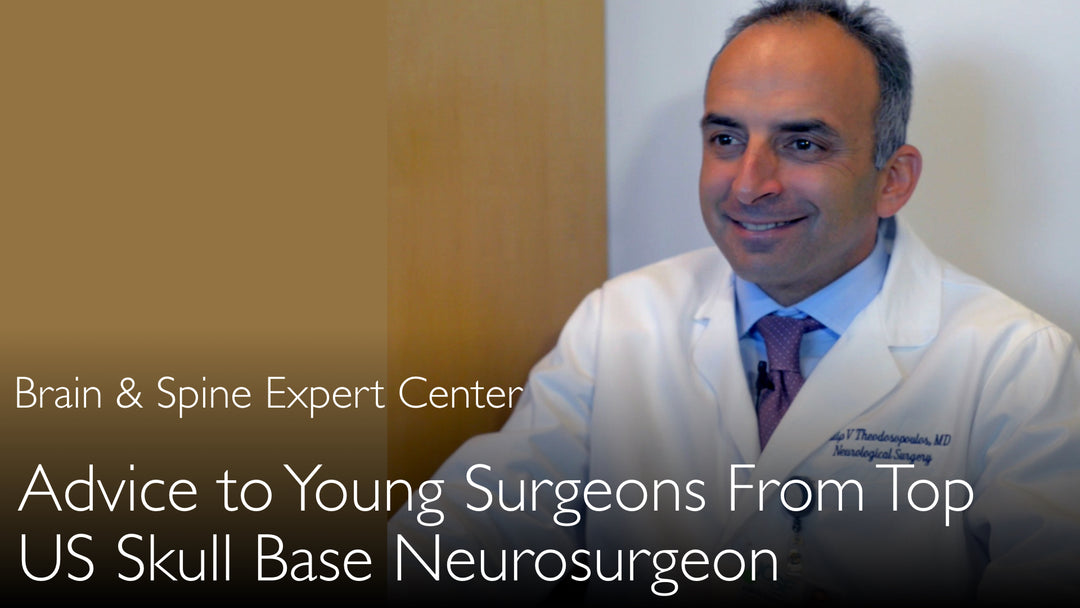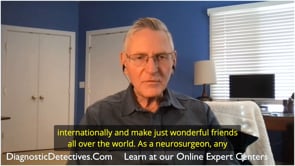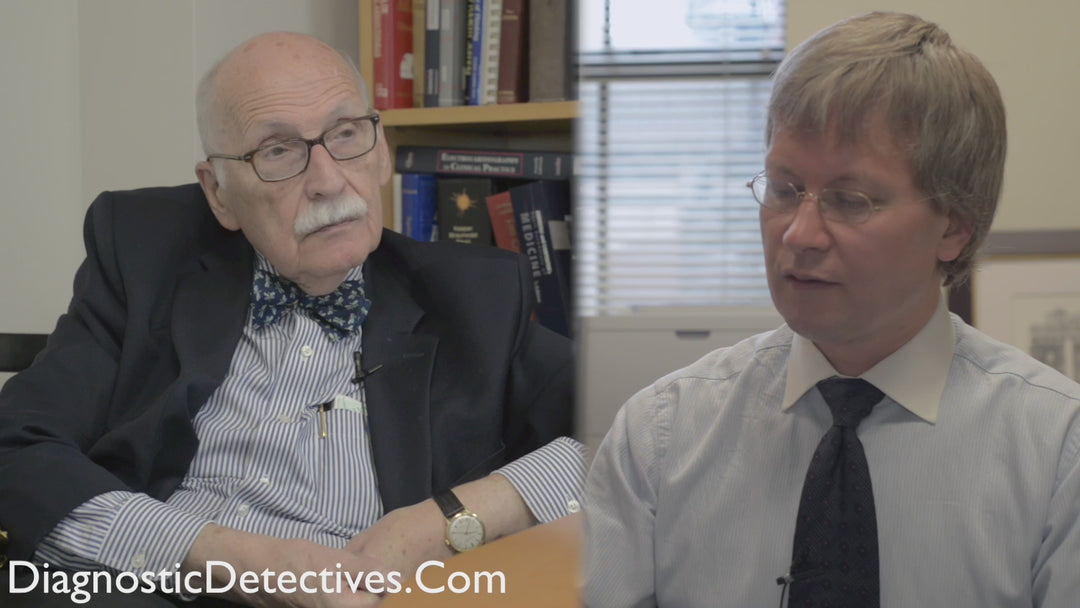Leading expert in neurosurgical training and education, Dr. Philip Theodosopoulos, MD, explains how young surgeons can build exceptional skills. He emphasizes the critical importance of self-directed anatomical study. Dr. Theodosopoulos advocates for a deep, personal commitment to mastering neurosurgical anatomy. He connects the concept of 10,000 hours of deliberate practice directly to surgical excellence. This foundational knowledge builds both technical skill and a genuine love for the field.
Essential Neurosurgery Training Strategies for Skill Development
Jump To Section
- Self-Assessment in Neurosurgery Career Choice
- Anatomy Study as a Training Foundation
- The Deliberate Practice Principle in Surgery
- The Power of Independent Study Commitment
- Passion and Sacrifice in Surgical Training
- Full Transcript
Self-Assessment in Neurosurgery Career Choice
Dr. Philip Theodosopoulos, MD, begins his advice with a crucial call for introspection. He cautions young surgeons against pursuing neurosurgery solely for its prestigious aura. A genuine internal motivation is the true cornerstone of a successful career. This self-honesty ensures a surgeon is in the right specialty for the right reasons.
Dr. Theodosopoulos believes being true to oneself is the first step toward excellence. This foundational mindset prepares a trainee for the immense dedication required.
Anatomy Study as a Training Foundation
Mastering anatomical knowledge is the single most actionable step for any trainee. Dr. Philip Theodosopoulos, MD, states that cadaveric specimens and skulls are accessible globally. A surgeon can develop an unparalleled understanding of the brain and spinal cord through dedicated dissection. This deep anatomical knowledge is not dependent on the prestige of a training program.
Dr. Philip Theodosopoulos, MD, emphasizes that studying anatomy fosters a profound love for neurosurgery. He has never seen a surgeon regret the time invested in the anatomy lab.
The Deliberate Practice Principle in Surgery
The concept of 10,000 hours of practice is directly applicable to surgical training. Dr. Philip Theodosopoulos, MD, references Malcolm Gladwell's "Outliers" to illustrate this point. Expertise in any field, including neurosurgery, requires thousands of hours of independent, focused practice. For a neurosurgeon, this practice involves intimate familiarity with the surgical subject.
Dr. Anton Titov, MD, discusses this principle as a significant personal investment. This time does not necessarily have to be spent exclusively on live surgery but on comprehensive study.
The Power of Independent Study Commitment
A structured residency program is beneficial, but individual initiative is paramount. Dr. Theodosopoulos argues that a surgeon's skill is ultimately self-forged. The 10,000-hour rule underscores the volume of independent effort needed to achieve mastery. This commitment to studying the brain transforms a trainee into an expert.
Dr. Philip Theodosopoulos, MD, is a strong advocate for this self-directed learning model. He confirms that this rigorous study consistently produces better, more passionate surgeons.
Passion and Sacrifice in Surgical Training
Becoming an expert neurosurgeon demands more than just study time. Dr. Philip Theodosopoulos, MD, highlights that sacrifice and a genuine love for the work are non-negotiable. The journey requires a deep passion for the field of neurosurgery itself. This emotional connection sustains a surgeon through the challenges of training and practice.
In his conversation with Dr. Anton Titov, MD, Dr. Theodosopoulos presents this as his core advice. He champions a holistic approach that combines knowledge, practice, and heartfelt dedication.
Full Transcript
Dr. Anton Titov, MD: What advice could you give to the young surgeon who is being trained in perhaps a less rigorous and less structured program that is typical for the best academic US residency programs? What can they do to build their skill set and high quality of training?
Dr. Philip Theodosopoulos, MD: There is no one piece of advice. Certainly I would start by saying: "Be true to yourself, and what you really want to do." Neurosurgery has a name and an aura. It is just like some other fields. Sometimes you are attracted to neurosurgery because of this aura; you are probably not in the right place. Being true to yourself in that is important.
The one thing that you can do, no matter where you are, is study anatomy. Cadaveric specimens exist everywhere. Skulls exist everywhere. Learn. It is the knowledge and the love you develop for the field by understanding your subject. In neurosurgery we are blessed with having a very small area of a subject. It is maybe a very important, maybe very sensitive area. But nonetheless that one area of the brain and maybe the spinal cord as well, but the brain in particular, where you can study it. Study it. Then know it! For that you don't need a structured program.
Many of the viewers will also know about, heard about, 10,000 hours of practice required for expertise. It was a few years ago at our Senior Neurosurgical Society meeting that we invited the author of a book [Malcolm Gladwell, book is called "Outliers"] to talk to us. He talked about where that 10,000 hours of practice came from and what it really means. It is a simple concept really.
Dr. Anton Titov, MD: Because it is 10,000 hours of individual independent practice of something you do. Sometimes you are a violinist—playing 10,000 hours of violin by yourself. Sometimes you are a car mechanic—10,000 hours of doing "car mechanic" on your own. If you are a neurosurgeon, then 10,000 hours of being with your subject, say, the brain. That does not have to be an alive brain.
Dr. Philip Theodosopoulos, MD: That does not have to be one particular type of tumor. But when you calculate what it takes to practice your craft for 10,000 hours, that is a lot of time.
Dr. Anton Titov, MD: It is an investment. I have seen no one who has come out of the lab dissecting, studying the anatomy, who, number one, has not fallen in love with studying the anatomy and the brain, and number two, had not become a better surgeon. I think that is my one piece of advice. Of course it takes a lot of things. It takes studying it. It takes sacrifice. It takes the love for it. But that would be the one thing in training of a young surgeon I would advocate for.
Dr. Anton Titov, MD: Dr. Theodosopoulos, thank you very much for this very fascinating and detailed discussion about your practice and about your views on neurosurgical training, practice, and teaching. I'm sure that we in the world will continue to hear about your fascinating achievements in clinical training, your work, and your teaching of neurosurgery—teaching the residents and through the courses that you are doing. Thank you very much!
Dr. Philip Theodosopoulos, MD: Thank you, Anton. I'm looking forward to seeing the effect your work has on this, in spreading all of this on a platform that is very important for all folks in the world to be able to see. Thank you!







